Buying a van in New Zealand has been the best (and scariest) decision on our trip. Not only do we have the freedom and flexibility to go wherever we want on our own schedule, but we basically have a portable cozy house that has saved us so much money in hostel costs!
If you get the right van, your main expenses become gas and food. And as much as I love backpacking, I’ve not missed packing and unpacking my backpack at each new destination at all. Van life in New Zealand is seriously awesome, so if you’d like more information about campervanning in New Zealand, please check out my guide. Read on here for everything you need to know about buying a campervan in New Zealand.
Table of Contents
Where to Find Van Listings
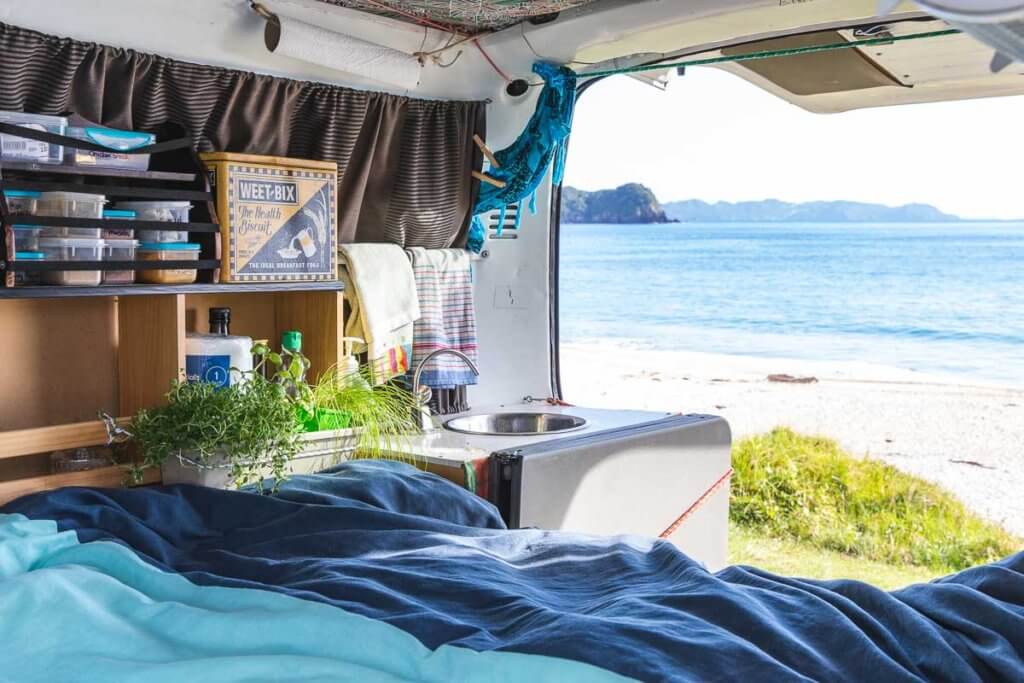
- Backpackerboard: The best place for van listings are the notice boards on backpackerboard.co.nz. The listings are mostly placed by other travelers and backpackers, which means that the vans are usually in the right price range and come with a bunch of extra gear and modifications that are great for travel. We found that the vans were a better deal here than on other sites.
- Trade Me: Trade Me is like New Zealand’s Craigslist. This is another great place to check for vans for sale. I’d for sure check both Backpackerboard and Trade Me. When we were buying, the vans on Backpackerboard were a bit cheaper, but I’ve talked to others who found a great deal on Trade Me.
- Backpackers Facebook Groups: You can also find van listings on Backpacker Facebook groups like Backpackers New Zealand. I found them harder to look through than the websites above, but it’s good to know about the option.
- Buy-back programs from rental companies: Some campervan rental companies will sell their older vehicles, or have buy-back programs where they guarantee to buy back the vehicle from you at the end of your trip. (eg Travel Cars New Zealand, BANZ Travel Cars, Ed’s Campervans in Auckland) The buyback price will be less than 50% of what you payed (sometimes much less), so only do this if you’re going to be very short on time. You might find a good van that you can later sell to other travelers, however, so it’s good to check what’s available.
- Paper Listings at Hostels: Your hostel will likely have van listings from travelers ending their trip and hoping for a quick sell.
- Backpackers Car Markets: This is a place for individuals and companies to sell their campervan (eg Backpacker Car World in Auckland). Individual sellers can rent a spot to sell their van. Companies will buy vans from backpackers who couldn’t or didn’t have time to sell their van (at quite a discount), and resell it to other backpackers. The companies are required to have a mechanical check and have all the paperwork in order, so the cars are likely reliable, but the prices are greatly inflated. I don’t have personal experience with these car markets, but I’ve talked to people who’ve had a good experience buying from individual sellers.
What Certifications or Registration Does a Van in New Zealand Require?
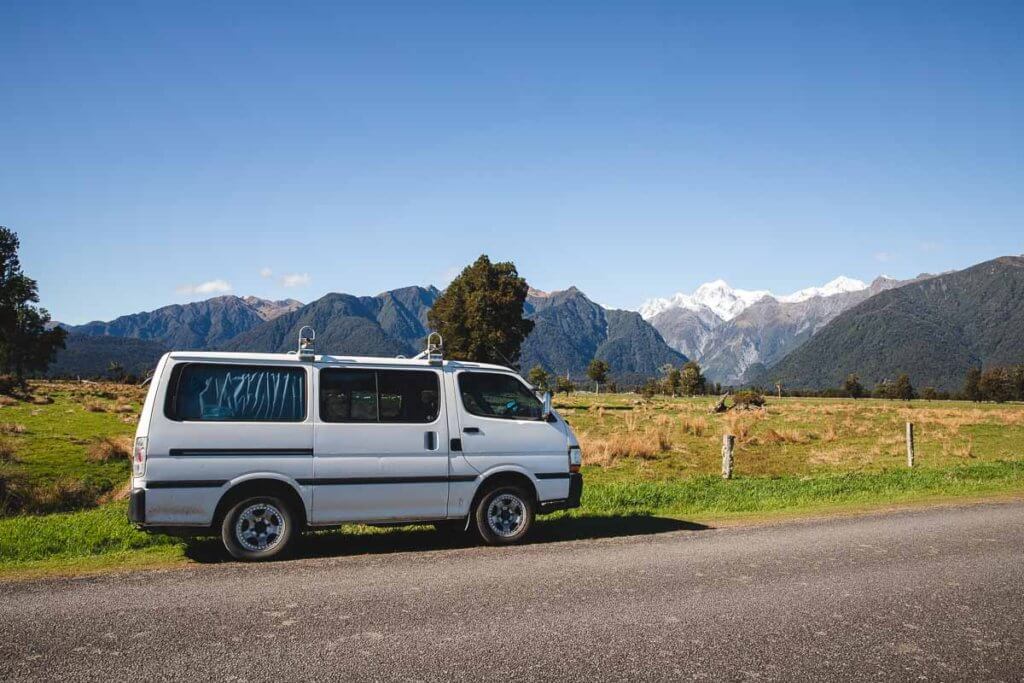
There are two certifications that a car needs to legally drive it in New Zealand. Make sure that the van you’re considering is covered for at least the first part of your trip, so that you don’t have to worry about it right away, and consider the renewal costs in your budget.
WoF: Warrant of Fitness
The WoF is a certificate that states that the vehicle meets required safety standards. It’s illegal to drive a vehicle without a WoF sticker on the front windscreen.
The WoF needs to be renewed every three years to six months, depending on the age of the car.
- first registered before 1 Jan 2000: renew every six months
- first registered after 1 Jan 2000: renew every 12 months
- first registered less than 3 years ago: 3 years after first registration
A WoF costs about $60, and can take as short as 30 minutes. The safety check includes tires, breaks, seatbelts and airbags, speedometer, steering, fuel system, doors, windows, etc.
It’s important to note that this is not a full report on the condition of the vehicle. The engine and other important factors are not checked: the WoF inspection is not the same thing as a pre-purchase inspection. A good way to think about it is that the WoF makes sure you vehicle is safe to drive or in a crash: it doesn’t take into account how well the engine has been maintained, and doesn’t care if the car stops while driving up a hill.
Rego: Vehicle Licensing
The rego is vehicle licensing. (Not the same as vehicle registration, which only happens once, so you don’t need to worry about it unless you buy a new car.)
A vehicle must be licensed at all times, and needs to have a current WoF in order to be renewed. It costs $52.11 for 12 months.
Pre Purchase Inspection
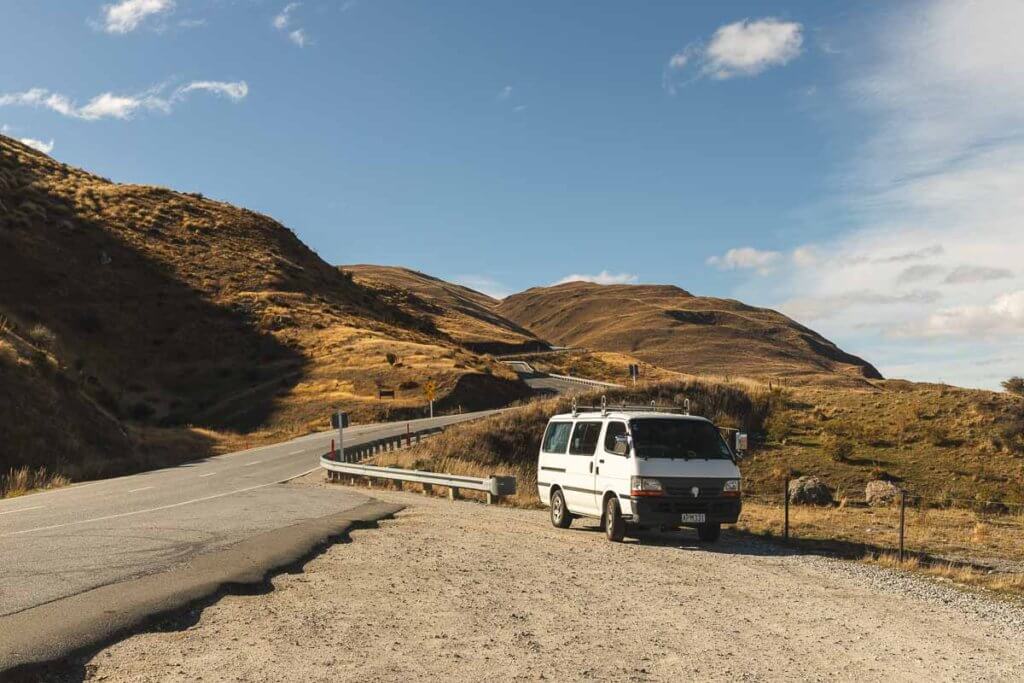
I definitely recommend a doing pre purchase inspection before buying your van. Assurance that your van won’t break on you two weeks into your trip is 100% worth your money. They will check over the working condition of the vehicle, provide a list of recommended repairs, as well as honestly tell you the condition of the vehicle.
You can go to any reputable mechanic. Automobile Association (AA) is a good option, it’s a nation wide chain that’s very reliable. VNTZ is another good alternative. If going with an independent mechanic, check that they are MTA licensed.
A pre purchase inspection costs between $100 – $190 NZD.
How to Pay Someone for The Van
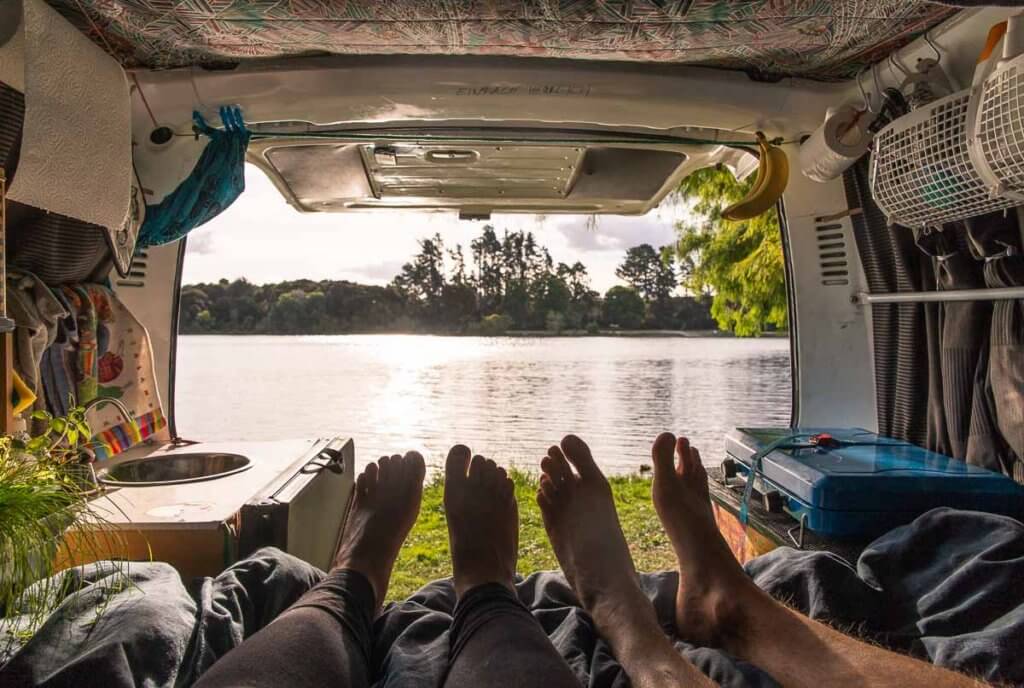
If you’re buying a van from fellow travelers and not from an agency with access to credit card machines, you’ll need a way to pay them, and carrying around thousands of dollars in cash is terrifying for everyone involved!
I recommend TransferWise, a money transfer service that’s way cheaper than doing an international bank transfer (there’s no markup on the exchange rate, like with a usual bank transfer). It’s transparent, safe, and for a small fee you can directly transfer the money from your bank to someone else’s. (Ask around for an invite for a free transfer!)
How to Transfer Ownership of the Van
So you buy a van: now what? How to make it legally yours? This part is actually stupid easy.
You need to go to a post office and ask for the ‘Change of registered person form – buyer’ (MR13B). You need your passport or overseas drivers license, and a credit card to pay $9. You’ll need a NZ address, but the hostel you’re staying at is sufficient. That’s it! Here‘s more info from the NZ transport agency, but they’ll basically say the same thing. 🙂
The seller will have to fill out a form transferring ownership as well.
How Long Does it Take to Buy a Van?
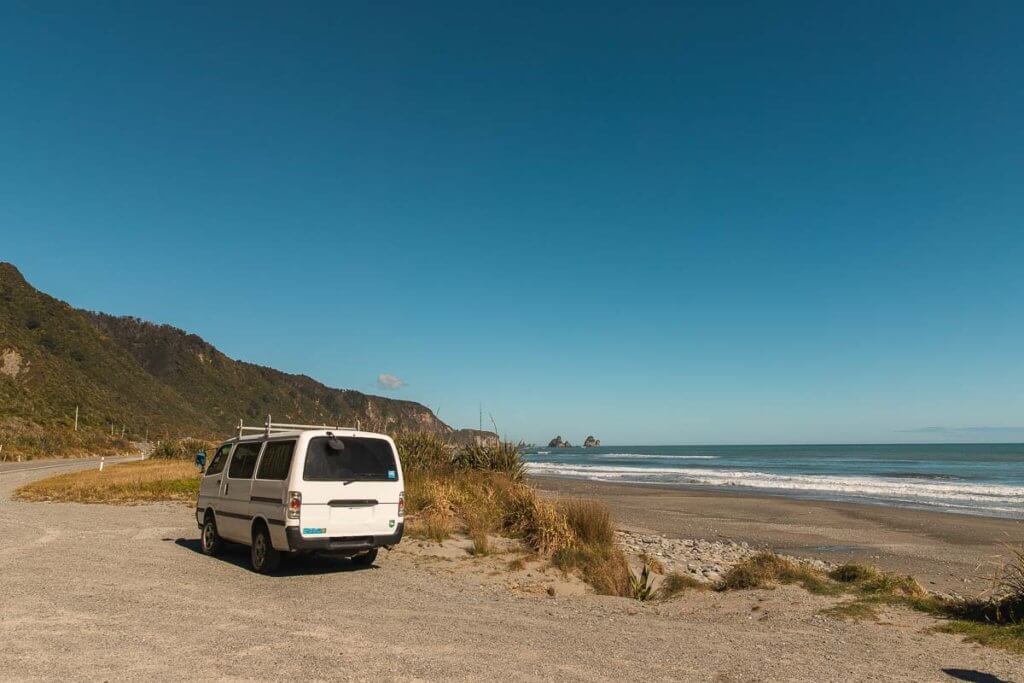
There are a lot of factors to consider here, but the safe-ish quick answer is two weeks.
The season matters a lot. Most backpackers come to explore New Zealand in the summer (December – February). This greatly affects the van market: everybody is buying vans in December through February, and then everybody is selling their vans in March and April. Thus, buying a van towards the end of summer will take less time.
It took us one week to contact five sellers, meet with three of them, make an offer, get a pre purchase inspection, fix some things that needed to get fixed, get together to pay the previous owners and get the keys, and go to the post office to transfer ownership.
That’s a lot of things to do, and we got lucky in the following ways. First, we fell in love with one of the three vans we saw: the other two were meh. If we didn’t like any of the vans we saw, we’d have to start the process from the beginning. Second, we bought our van in the beginning of March: the perfect time to buy a van. Thus, I’d recommend budgeting two weeks to buy a van.
Buying a Car with a Foreign Drivers License
You can drive and buy a car in New Zealand with a foreign drivers license if:
- You have a current foreign drivers license
- You’ve been in New Zealand for less than 12 months
- Your license is in English (or has an accurate translation)
- You don’t have a disqualification or suspension in New Zealand
Most travelers or people with a working holiday visa will easily qualify. More info can be found here.
New Zealand Car Insurance
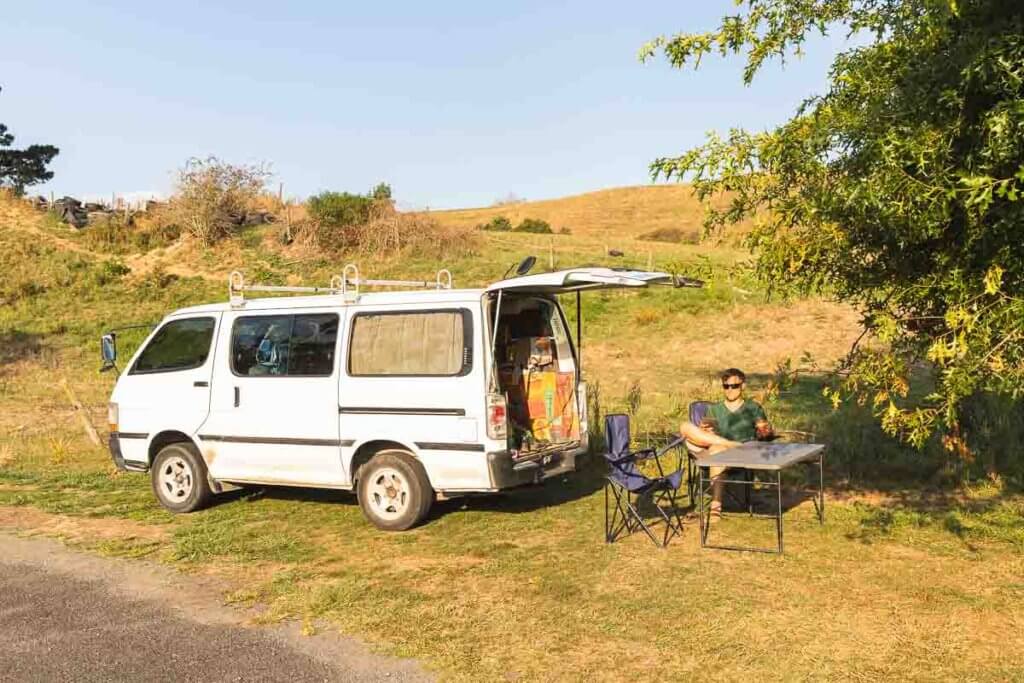
Car Insurance isn’t required in New Zealand. Having some sure makes me feel better about driving on the left side of the road, however.
You can get comprehensive insurance, which covers your car and any damage to someone else’s vehicle or property, or third party fire and theft, which covers any damage to someone else’s car or property, and your vehicle for fire and theft.
We opted for third party fire and theft insurance through AA Insurance, which cost us $340 NZD for one year, or $28.30 per month.
How Much Does a Van in New Zealand Cost
This obviously depends on a lot of factors, so a very generous range is $3000 – $12000 NZD for a used, self-contained van.
What will affect the price?
- Season: Like discussed above, the vans will cost much more in November through February, and much less in the other months.
- Mileage and age: most of the vans for sale are at 100,000 – 200,000 miles. What really matters is how well the van was treated during those miles, but the mileage affects the price.
- Self-contained: I’ll expand on what self-contained means below, but vans that have been converted to self-contained vehicles will cost more.
- Where you buy it: sales between travelers will cost less than buying from a company.
- Extras: Does it comes with a lot of really good gear, or is it pretty bare bones?
Since we’re planning on living in New Zealand for the good part of a year, we took the middle road between budget and comfort: our van cost us $7500 NZD, and it is the bestest ever, if I do say so myself! 🙂
Why You Should Get a Self-Contained Van
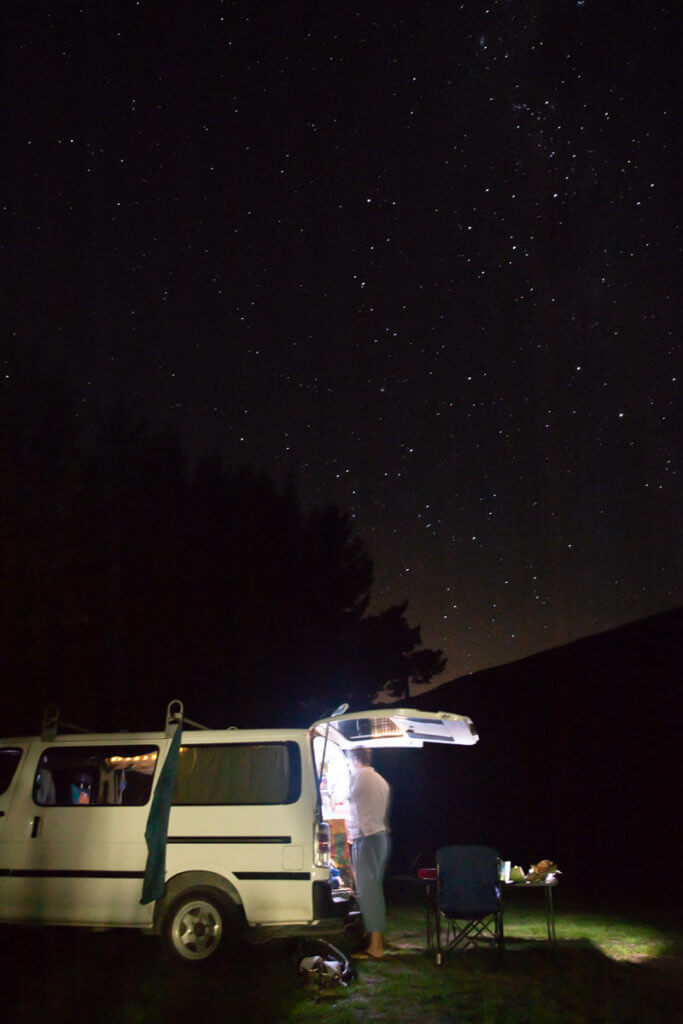
A vehicle that is self contained is able to support the passengers for three days, leaving absolutely no trace: leaving behind no trash, soapy water, food waste, pee, poop, etc. The advantage of a self-contained van is that you can ‘freedom-camp.’ There are free spots for self-contained vehicles to stay in most locations, as well as free public land camping in some regions. This is a huge advantage, and has saved us tons of money.
To be self-contained, a van must have:
- A fresh water tank with 12L of water per person
- A grey water tank (waste water) with 12L per person
- A sink connected to the water-tight grey water tank
- A trash can with a lid
- A toilet, 3L per person
Definitely look for vans that are certified self-contained. They’ll cost more, but are worth it. The resale value will likewise be higher.
For more information on freedom camping, check out my New Zealand Van Camping Guide, where I discuss freedom camping, as well as DOC campsites, private campgrounds, and holiday parks. For the best way to find campsites, I have a guide to the best apps for traveling in New Zealand, including the best freedom camping apps.
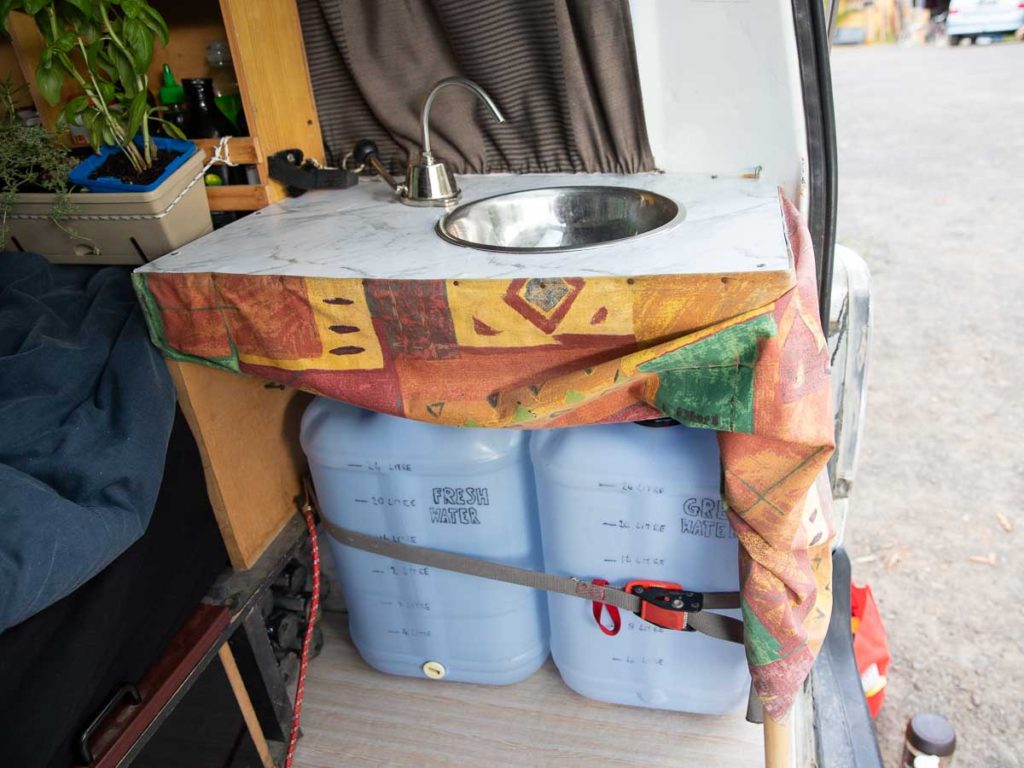
Tensions With Locals
You know how whenever there’s an awesome thing that’s great for everyone but requires a little bit of work, and then some assholes always ruin it for everybody? Yea. There have been instances of travelers with self-contained vans leaving trash, and even pooping on the beach. This gives us a bad rep with the locals in some areas.
Please please honor the self-contained rules and actually leave no trace! Respect the locals and the environment!
I’ll be honest, most people don’t use their portable toilets in their self-contained vans, including us. I just really really don’t want to deal with emptying our waste every three days. So in order to honor our self-contained status, we always always stay somewhere with a bathroom. Most of the time, we can drive a little further and find a free spot with a toilet, but if not we pay for a campground. That’s the consequence of our choice to not use the toilet.
What to Look for When Buying a Van
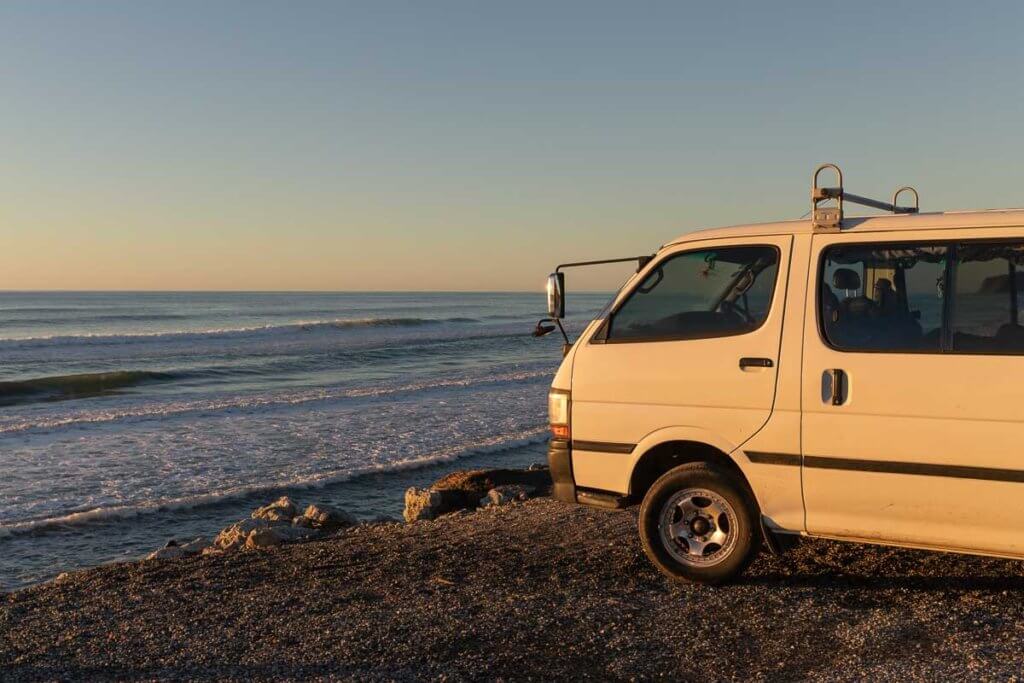
Looking at a bunch of van listings is super overwhelming, and soon they start to kind of bleed into each other. I recommend making a spreadsheet with your favorites, making it easier to compare them.
| Make/Model | Ex: Toyota Hiace |
| Year | Affects WoF renewal time, general wear and tear |
| Price | How much is it gonna hurt |
| Mileage | Don’t be too scared of high mileage, how well it’s been taken care of is more important |
| Self-contained | Strongly recommended! |
| WoF | Date WoF expires |
| Rego | Date Rego expires |
| Gas or diesel | Diesel is cheaper, but there’s road user charges that eliminate the advantage |
| Automatic or manual | We unfortunately had to eliminate all the manual vans: there’s plenty of automatic ones though! |
| Bed | How wide is the bed? How long? How big are you? My boyfriend (>6′) was too tall for some of the beds |
| Storage | How much storage is there, is it easily accessible? |
| Kitchen | Where is the kitchen? How nice/convenient is it? Do you cook a lot? |
| Extras | Cooking gear, camping gear, cooler, roof rack, sun roof, etc |
| Drawbacks | Inefficient, small bed, shitty kitchen, high mileage, etc |
| Comments | Anything else that caught your eye |
Once you have a list of five to ten vans with all of their information, you have to decide what your priorities are. Is your budget the main concern? Do you have a lot of stuff to store? Do you cook a lot? Is a comfy bed imperative? You’re limited on space, so you can’t have everything: you have to prioritize what’s important to you.
Our priorities were comfortable bed, nice useable kitchen, and lots of easily accessible storage. Think about what your priorities are and then contact ~5 van owners to arrange a viewing.
Best Van Setups
Van setups are limited only by the imagination of their creator, but several different setups popped up a lot. This is very much whatever your preference is, and what your priorities are. Since I’d never lived in a van before, however, I didn’t really know what setup I would prefer. I’ll provide my opinions now so you have some context to make your own.
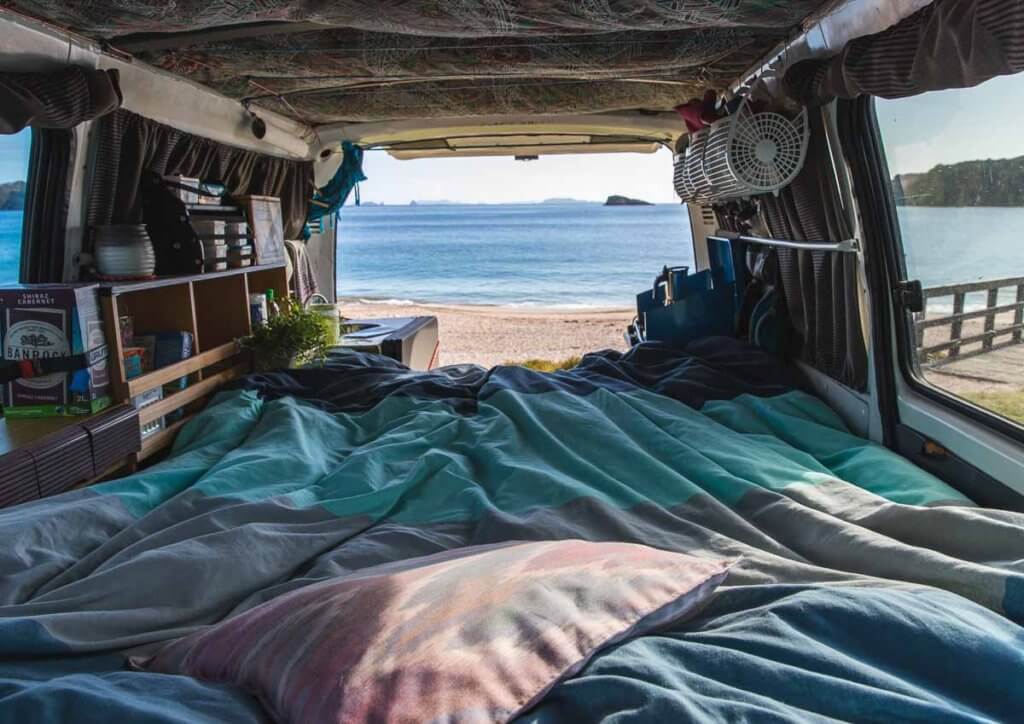
Kitchen in the Back or in the Front
As you look at van listings, you’ll see that kitchens are usually either right behind the two front seats, or in the tailgate. In my opinion, it’s better to have a kitchen in the back. There’s limited available space, and a front kitchen must have some room in front of it for the person cooking. A tailgate kitchen utilizes the space behind the car as cooking space: it’s more space efficient.
That said, I love that our kitchen doesn’t take up the entire back: there’s space to enter and exit the van through the back, and we can cook from the inside on rainy days. Best of both worlds!
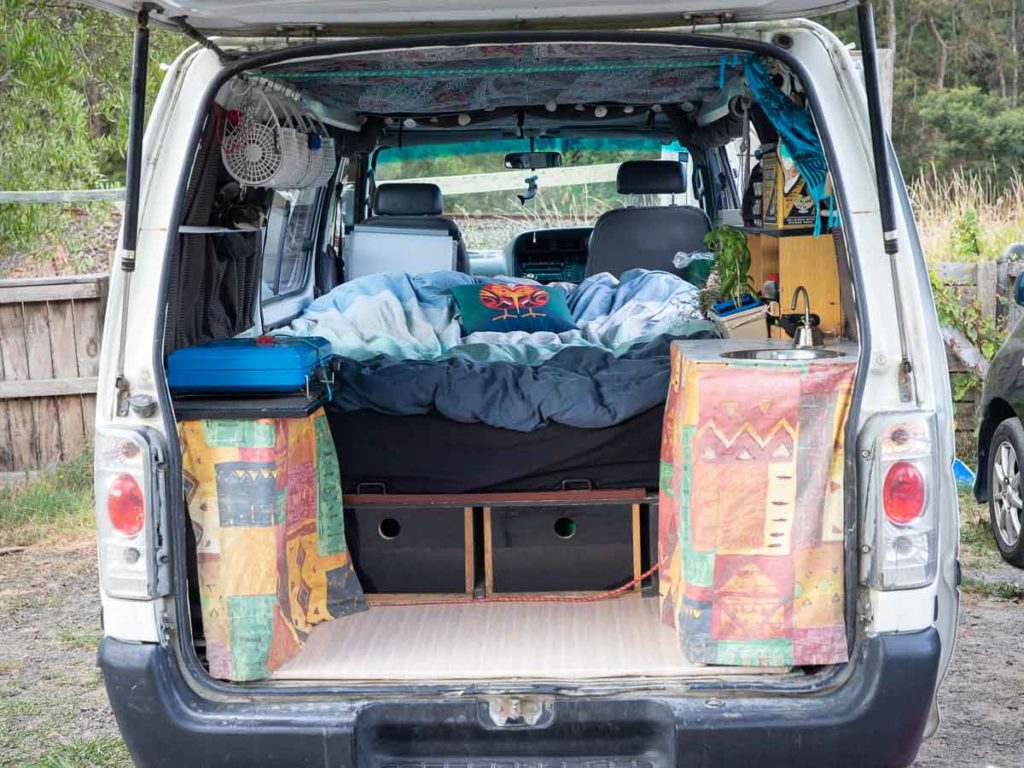
Convertible Bed to Living Room, or Permanent Bed?
Many of the vans have cool transformer like designs where the bed folds up into couches for daytime. Some people love this, but I recommend a permanent bed for these reasons:
- You can have a better mattress with a permanent bed. Transformer mattresses have to be able to fold up into couch cushions, so you sacrifice a lot of comfort. Because of our permanent bed, we were even able to get a memory foam topper!
- There’s already a lot of putting things away and securing things for the road in vanlife: living room transformation designs take up extra time in the mornings and evenings!
- We were told that the living room option is a great way to watch movies on rainy days: we manage to watch movies on our super comfy memory foam bed just fine! 😛
The First Look: Viewing the Van
It’s important to think about your priorities, wish lists, and budget before contacting sellers, but van pictures can only get you so far. As anyone who’s ever online dated can tell you, seeing the van in person is crucial, and can completely change your opinion! It was love at first sight for our van, and seeing the others just confirmed our choice!
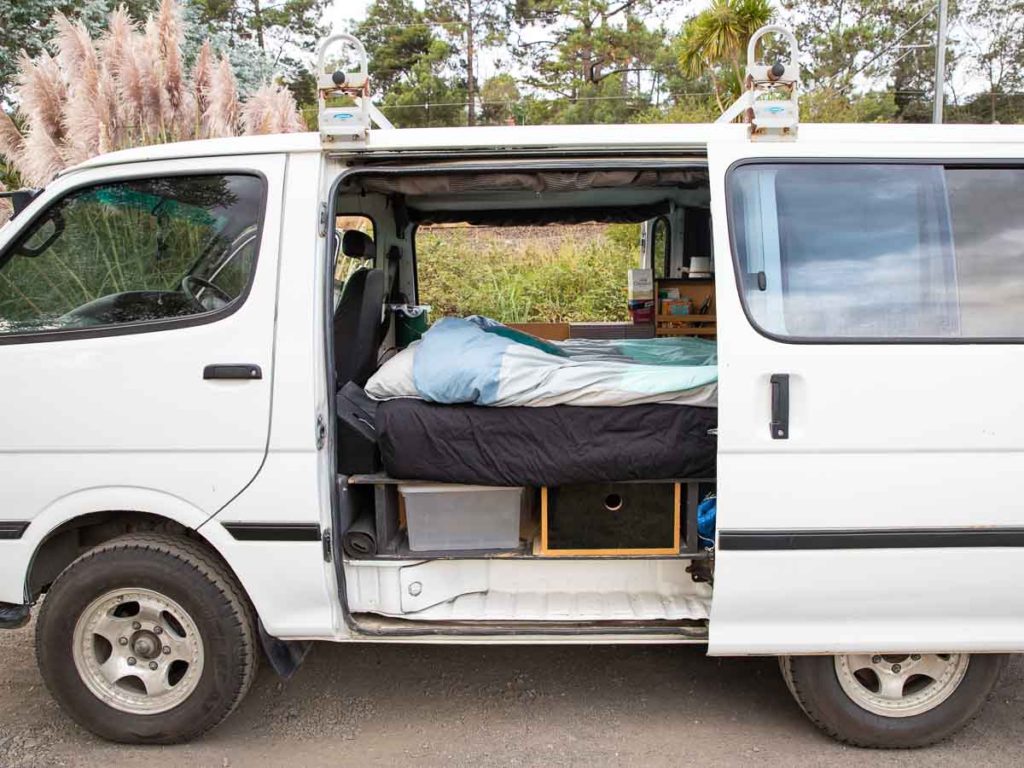
Things to do at a Viewing
- Bring a notebook and take ferocious notes on everything: the vans you see blend together in your brain: keep the facts and impressions clear!
- Look at the engine: if you don’t know anything about engines (like me!), just make sure that it isn’t too grimy/rusty/leaky/etc. At the least, you can compare it to the other vans you see. The mechanic at the pre purchase inspection will do the rest.
- Drive it, or at least sit in the passenger seat while the seller drives it if you’re still a bit nervous and you’re in a busy part of town. Listen to the engine, (any weird noises?), does it drive, brake, and turn relatively smoothly?
- Lay on the bed! You’ll be spending a lot of the time there, and you want to make sure it’s comfortable and that you fit.
- Open the drawers, storage: are they easily opened/accessed?
- Does the interior feel cozy and inviting? This will be your home for many months, so this is important too!
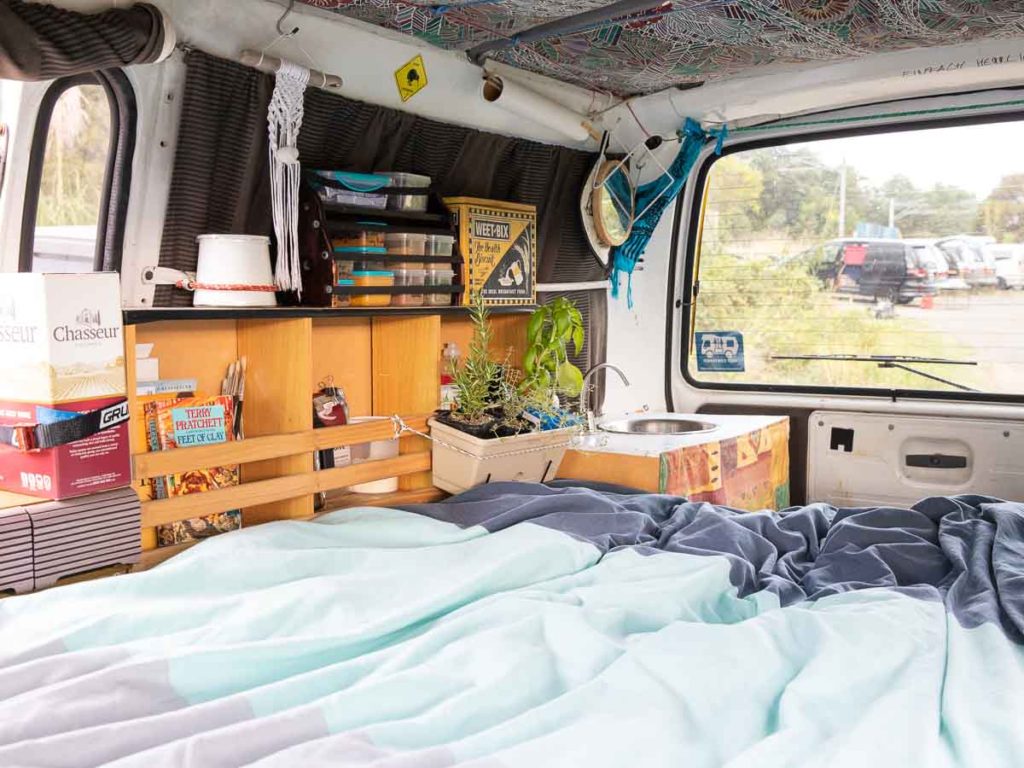
Questions to ask the Seller
- Would they be OK with a pre purchase inspection? (If no, it’s not worth it)
- How long they had the van
- What mechanical work did they get done
- Did they have any trouble during their ownership
- What is the fuel efficiency?
- Where did they store their clothes/food/toiletries/backpacks, was it easy to access every day items?
- If they have a convertible living room, how often did they convert it? Ask them to show you how to do it.
- Was it warm at night?
- Their favorite thing about the van
- Their least favorite thing about the van
The viewing is both for assessing the van and the sellers. The van should be in good shape to the best of your knowledge, and the setup should be efficient and inviting.
You should also vibe with the sellers. They should seem responsible, be happy to answer questions, know things about the mechanical condition of the van, and in general seem like nice people. We loved the couple who previously owned our van, and that contributed a lot to having a great buying experience, and good vibes all around. We even went out for Indian food after!
Final Thoughts
In conclusion, buying a van is undoubtedly a risk. It’s a lot of money, you have to at least somewhat put your faith in strangers, and it’s a lot of work. It’s totally worth it though, and following my advice above you can greatly mitigate that risk!
The flexibility and freedom alone transform your New Zealand experience. In addition, you save a ton of money on buses, hostels, and food. You can sell your van on to other travelers to recoup some of the upfront costs.
If funds are tight, make sure to check out my article on New Zealand working holiday visas, where I discuss all the logistics of living and working in New Zealand for a year. Also check out my post on how to find a job on a working holiday visa here. For a comprehensive guide to campervanning in New Zealand, refer to my post here.
I wholeheartedly recommend buying a van and traveling New Zealand with your own cozy little home!
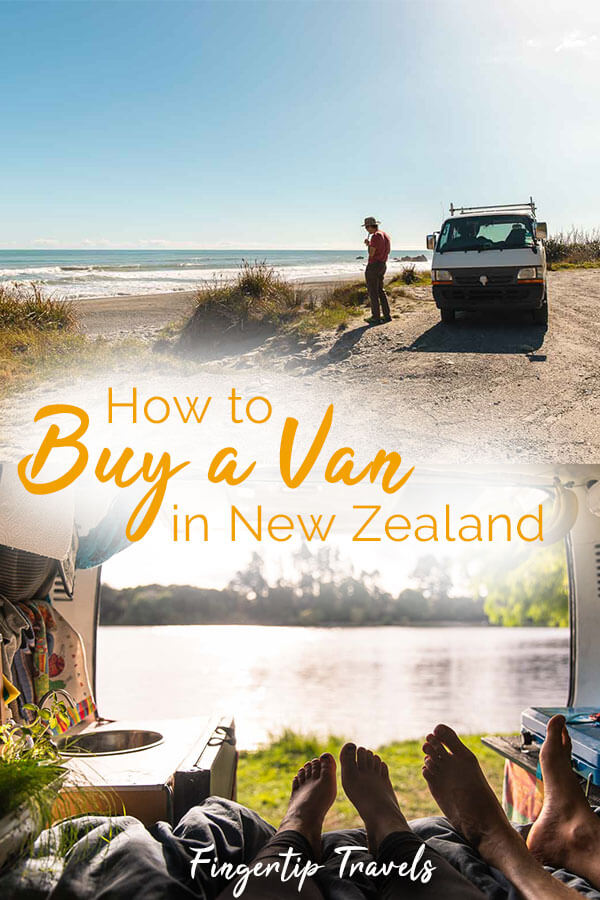

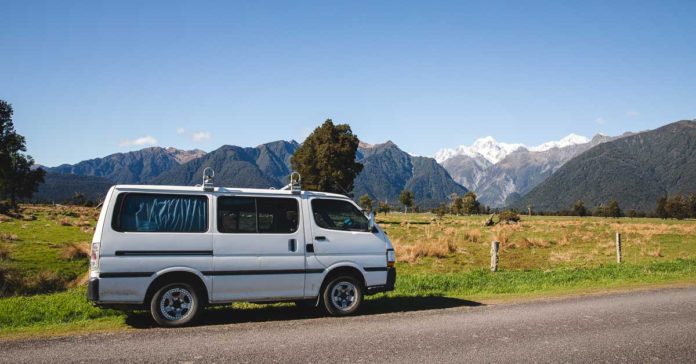


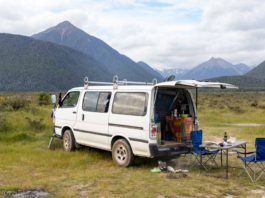
Thank you for this post! We are heading to New Zealand this June and really hope to buy a van as soon as we can! In regards to the Pre-Purchase inspection – does the current van owner take the van for this or mechanic come to them? or something different? haha hope that makes sense!
Chat Soon, Alicia
Hi Alicia!
In our situation, the current van owner took the van to the inspection bc it was a holiday weekend and most mechanics were closed.
If you go through AA, they say that they have mechanics that can come to you in Auckland, Wellington, Christchurch, or Hamilton, although I don’t have personal experience with that.
Usually you would pay for it, so it does involve the owners trusting you, although you can use it as part of the negotiation if you like!
Good luck with the purchase and your travels!
This is wonderful, thank you so much for all the information. By far the best guide on buying a car in New Zealand I have come across. Were going soon, and everything said here was something I believe will benefit me.
Thank you so much!
Kia Ora Masha!
thank you for all the information and help!
😀
Kia Ora, good luck! 🙂